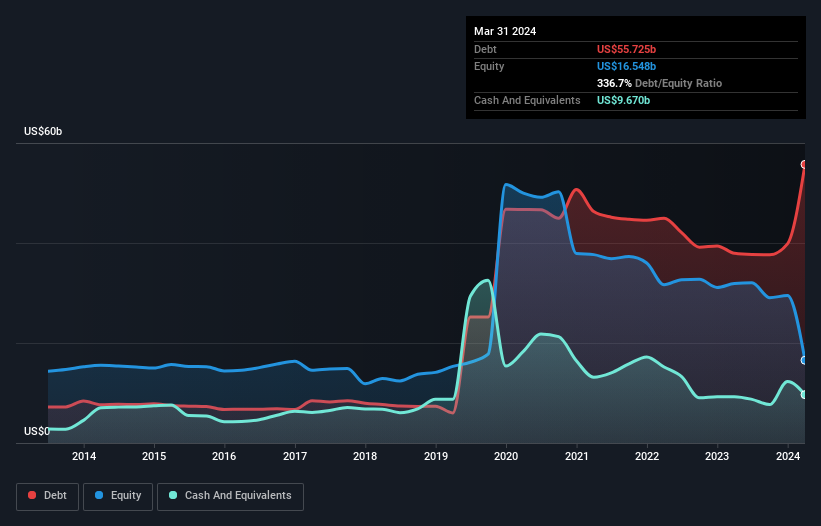Does Bristol-Myers Squibb (NYSE:BMY) Have A Healthy Balance Sheet?
Warren Buffett famously said, 'Volatility is far from synonymous with risk.' It's only natural to consider a company's balance sheet when you examine how risky it is, since debt is often involved when a business collapses. Importantly, Bristol-Myers Squibb Company (NYSE:BMY) does carry debt. But is this debt a concern to shareholders?
When Is Debt A Problem?
Debt and other liabilities become risky for a business when it cannot easily fulfill those obligations, either with free cash flow or by raising capital at an attractive price. If things get really bad, the lenders can take control of the business. However, a more usual (but still expensive) situation is where a company must dilute shareholders at a cheap share price simply to get debt under control. Having said that, the most common situation is where a company manages its debt reasonably well - and to its own advantage. The first step when considering a company's debt levels is to consider its cash and debt together.
View our latest analysis for Bristol-Myers Squibb
How Much Debt Does Bristol-Myers Squibb Carry?
You can click the graphic below for the historical numbers, but it shows that as of March 2024 Bristol-Myers Squibb had US$55.7b of debt, an increase on US$37.9b, over one year. However, it does have US$9.67b in cash offsetting this, leading to net debt of about US$46.1b.
A Look At Bristol-Myers Squibb's Liabilities
We can see from the most recent balance sheet that Bristol-Myers Squibb had liabilities of US$25.8b falling due within a year, and liabilities of US$56.7b due beyond that. On the other hand, it had cash of US$9.67b and US$14.1b worth of receivables due within a year. So it has liabilities totalling US$58.8b more than its cash and near-term receivables, combined.
This deficit is considerable relative to its very significant market capitalization of US$85.7b, so it does suggest shareholders should keep an eye on Bristol-Myers Squibb's use of debt. Should its lenders demand that it shore up the balance sheet, shareholders would likely face severe dilution.
We use two main ratios to inform us about debt levels relative to earnings. The first is net debt divided by earnings before interest, tax, depreciation, and amortization (EBITDA), while the second is how many times its earnings before interest and tax (EBIT) covers its interest expense (or its interest cover, for short). Thus we consider debt relative to earnings both with and without depreciation and amortization expenses.
Bristol-Myers Squibb's net debt is 2.5 times its EBITDA, which is a significant but still reasonable amount of leverage. But its EBIT was about 10.8 times its interest expense, implying the company isn't really paying a high cost to maintain that level of debt. Even were the low cost to prove unsustainable, that is a good sign. Unfortunately, Bristol-Myers Squibb's EBIT flopped 13% over the last four quarters. If earnings continue to decline at that rate then handling the debt will be more difficult than taking three children under 5 to a fancy pants restaurant. When analysing debt levels, the balance sheet is the obvious place to start. But ultimately the future profitability of the business will decide if Bristol-Myers Squibb can strengthen its balance sheet over time. So if you're focused on the future you can check out this free report showing analyst profit forecasts.
Finally, while the tax-man may adore accounting profits, lenders only accept cold hard cash. So we clearly need to look at whether that EBIT is leading to corresponding free cash flow. Over the last three years, Bristol-Myers Squibb actually produced more free cash flow than EBIT. That sort of strong cash generation warms our hearts like a puppy in a bumblebee suit.
Our View
Bristol-Myers Squibb's conversion of EBIT to free cash flow was a real positive on this analysis, as was its interest cover. But truth be told its EBIT growth rate had us nibbling our nails. When we consider all the factors mentioned above, we do feel a bit cautious about Bristol-Myers Squibb's use of debt. While we appreciate debt can enhance returns on equity, we'd suggest that shareholders keep close watch on its debt levels, lest they increase. There's no doubt that we learn most about debt from the balance sheet. However, not all investment risk resides within the balance sheet - far from it. We've identified 2 warning signs with Bristol-Myers Squibb , and understanding them should be part of your investment process.
At the end of the day, it's often better to focus on companies that are free from net debt. You can access our special list of such companies (all with a track record of profit growth). It's free.
Have feedback on this article? Concerned about the content? Get in touch with us directly. Alternatively, email editorial-team (at) simplywallst.com.
This article by Simply Wall St is general in nature. We provide commentary based on historical data and analyst forecasts only using an unbiased methodology and our articles are not intended to be financial advice. It does not constitute a recommendation to buy or sell any stock, and does not take account of your objectives, or your financial situation. We aim to bring you long-term focused analysis driven by fundamental data. Note that our analysis may not factor in the latest price-sensitive company announcements or qualitative material. Simply Wall St has no position in any stocks mentioned.

 Yahoo Finance
Yahoo Finance 
